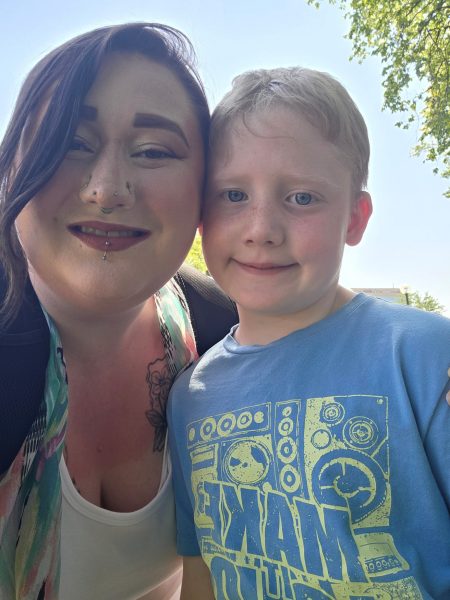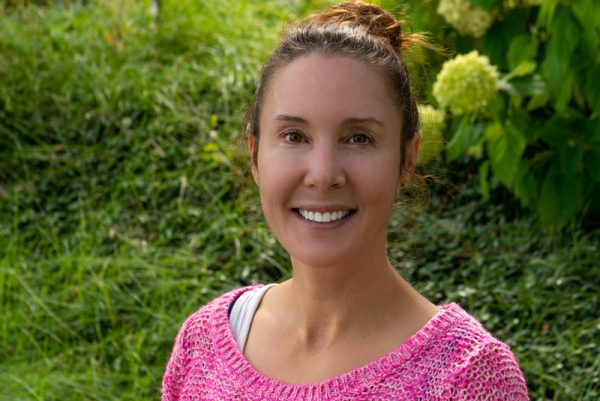When Haley Baker first began the Human Services Diploma, she was entangled in complex trauma related to unmanaged bipolar disorder and uncontrolled substance use. Baker’s trajectory began to derail around 2015, when she was 14, and continued into 2022.
“It was a very long journey,” said Baker. “I’ve been through the ringer, but I came out on the other side with gratitude. I found the motivation to be better, not just myself, but for my son Marley, now 8, who has autism. My education was a driving force for pursuing and maintaining my recovery, and Accessibility Services helped me learn on my own terms.”

As a proud mom, Baker is endlessly inspired and motivated by her son, Marley.
In particular, Evelyne Penny, learning specialist, played a critical role in Baker’s sobriety success story by providing academic support in both on-campus and online learning settings, including during the six weeks Baker spent in a rehabilitation facility.
“Part of my first year in the Social Work program was spent in a substance-use treatment centre. Evelyne saw me through that experience; she was so helpful, and I never felt judged. I didn’t know what was going to happen next, but she was just so confident that I was going to make it. Her support was very special to me.”
To Baker, the TRU connection through Penny had tethered her and served as a reminder of what she was returning to in Kamloops.
“Treatment turned out to be one of the best experiences of my life,” said Baker. “Even though I was scared at first and worried about staying there for six weeks with a bunch of other women that I didn’t know. However, it was beautiful getting to know them and engaging in group sessions, watching us all flourish despite the horrors we had endured. Even though our stories and experiences may have been different, they shared similar patterns. It was beautiful to be a part of collective healing.
“Completing the course during that time also helped me, as it was an Indigenous-perspective course that significantly aided my learning in treatment, and it made me recognize that stories are lessons and a means of sharing information. Storytelling is healing.”
She noted there was also a social worker at the treatment facility who received their degree from TRU. “It was really cool to connect and have them reinforce to me that completing even just one course during treatment was a big deal.”
Baker praised Penny and the Accessibility Services advisors for being so good at meeting students where they are, rather than trying to force them into goals they might not be ready for yet. “That’s precisely the type of attitude that helped me out so much because it wasn’t about ‘You should graduate, or you should do this a certain way’. It was about ‘thank you for being here today.’”
“Haley is a completely amazing student and person,” said Penny. “She’s a passionate disability advocate, she’s always on time, super reliable and so bright. She’s pretty neat.”

Evelyne has been a Learning Specialist with Accessibility Services for 25 years. She also holds instructional contracts as a popular fitness instructor in ESL programs through TRU World and TRU Recreation.
Numerous historical, ancestral, bureaucratic and systemic factors can lead someone to feel alienated from, abandoned by or not cared for by the systems meant to uplift communities. “Collective trauma is such a real phenomenon, especially when we have political discrepancies going on for everyone at the same time. It makes it even harder for people who are already struggling to get back on their feet.
“Some folks keep getting knocked down; it’s like living your life in a boxing ring, one blow after another,” said Baker.
Baker said Penny and her other supporters lifted her back up when she didn’t have the energy to do it for herself.
“Patience, grace, self-love and acknowledgement of progress are key, but that’s where your support systems come in – to remind you – they see you when you can’t see yourself. I want to provide that helping hand for others. If someone sees you, someone who believes in you, someone who says, ‘Listen, I see you. Whether you realize it or not, you’re making progress. Keep going’ – that can get you back on your feet, back in the ring.”
“Evelyne’s support has been so transformational. She worked with me step by step until I felt confident. She really helped me transition from Open Learning to in-person learning. That was hard, but she really believed in me and trusted my process, and that made such a difference.”
The comorbidities of trauma, such as anxiety and depression, can cloud whatever motivation you have to move forward and impede executive functions like memorization, recall and time management. “We must be compassionate and considerate not only of ourselves, but also of others. We don’t know what their barriers all entail unless they explicitly tell us. Life is not easy or fair, and systems don’t make it any easier or fairer.
“I want to show people that collective care is more important than tearing each other down,” said Baker.
Now in her final year of her Bachelor of Social Work, Baker will take her first Law School Admissions Test (LSAT) in November. “I’m really determined to get into TRU’s law program, but I’m just grateful to be at this place in my life to pursue this goal. My lived experiences were definitely painful for my family, but seeing my progress and taking pride in it is genuinely heartwarming for them. Not long ago, my dad said that the change is like ‘night and day’. It’s really nice to have positive reinforcement. I celebrate every little win.”
Baker, a three-time recipient of the Out of the Ashes Bursary from Day One Society and winner of the TRU Social Work and Assurance bursaries, is incredibly proud of what she has survived, who she has become and how she takes care of herself and the people around her. “I love sharing my story because it just shows that anyone can overcome these hardships and do good things. Your past doesn’t define your future.”
Accessibility Services provides equitable access to education through academic accommodation and services to all eligible TRU students, both on campus and through Open Learning. Supports are tailored to a student’s needs based on documentation provided by a qualified health-care professional and the functional impact of the disability or health condition.

